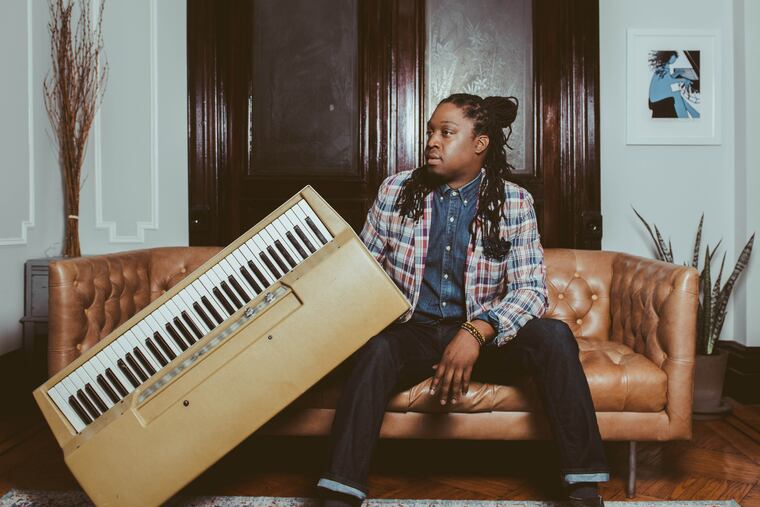George Burton’s stretching the boundaries of jazz: ‘We’re playing music; we need everybody’
Jazz pianist George Burton brings his new album, Reciprocity, to Philly this week.

Since leaving his native Philadelphia for New York in 2003, jazz pianist George Burton has been pretty busy, in demand on the stages of Jazz at Lincoln Center and the Newport Jazz Festival. So busy, in fact, that it took him until 2016 to release his debut album, The Truth of What I Am > The Narcissist. Fortunately, it didn’t take him quite so long to follow it up, with his new album, Reciprocity.
Burton’s jazz is multidimensional. It incorporates influences from hip-hop and R&B, electronic music and indie rock into a surprisingly cohesive sound shaped by his mastery of vibe — a soulfulness that underlies all of his tunes, whether the surface feels more like hard bop, avant-garde explosiveness, or blissed-out atmospherics (like his cover of Sigur Rós’ “Ti Ki”).
Reciprocity is also laced with sound bites from Sun Ra Arkestra bandleader Marshall Allen, who Burton interviewed during a European tour. The 95-year old saxophonist offers eccentric words of wisdom like “When you’re playing music … you affect people’s destiny,” or “Music is dangerous. It can turn on you.”
The CAPA and Temple grad still has strong ties to his hometown. He’s toured extensively with the Odean Pope Saxophone Choir and the Sun Ra Arkestra, returns annually with his “Yule Log” holiday show (most recently last month at the Art Museum) and continues to stock his band with musicians with local ties. On Reciprocity, that includes saxophonist Tim Warfield, vocalist Alexa Barchini, and drummers Wayne Smith Jr. and James “Biscuit” Rouse. And, this week, he returns home to release his new album at Chris’ Jazz Cafe on Friday.
We spoke with Burton about the new album, his old jazz elders and where the “young cats” of jazz in Philly are hanging out these days.
What was the inspiration behind the music on the new album?
The title, Reciprocity, reflects the way I look at jazz. I have my own band, but I don’t look at it as “my band.” We all bring our own piece to the music. I’d be an idiot to say, “This is my show and it’s all about me.” I’m not that narcissistic. So all the tunes were written so the way they’re played is like a continual thought process, each of us pushing the same idea and narrative all the way through.
Why did you decide to record your conversations with Marshall Allen?
I’ve been touring with the Arkestra off and on since 2012, and I realized over the years that Marshall is always talking about music, and his perspective is much different than the educational system approach or the jazz club approach. He talked about music from a life perspective, which I can appreciate. I felt like a lot of things that he was saying were ideas that we shared in common, and I wanted people to hear it from the perspective of somebody who’s been here this whole entire time. Marshall’s 95, going on 96, so he’s lived through almost every period of jazz history. He’s an elder, and not many people have the experience of learning from the elders these days.
You’re playing at Chris’ on Friday — where do you go to hear jazz when you’re in town?
For a long time the best [stuff] was either at Ortlieb’s or Zanzibar Blue. Chris’ seems to be the best place to hear jazz these days. You get a wide range of talent, with jam sessions and young cats hanging out. It’s picked up a little bit of what Ortlieb’s used to be, though you can’t recreate that vibe. Then right down the street there’s Time, where you get a lot of the young cats who are more into the hip-hop and funk stuff. Some of them are just ridiculous.
Do you keep an ear out for the young players in the city?
I keep an eye on the scene as much as I can. I watched drummer Nazir Ebo grow up — I also watched [his older brother, drummer Justin Faulkner] grow up, so that’s weird. As soon as I heard something I could use, I snatched Nazir up. [Ebo will be performing with Burton on Friday.] Now there’s Mekhi Boone [young drummer and son of bassist Mike Boone], and there are a bunch of kids over at Temple that sound amazing.
Who were your mentors as you were coming up on the scene?
Pianist Sid Simmons was my number one mentor. When I was a broke college kid at Temple, Ortlieb’s closed at 1 a.m. and SEPTA stopped running around midnight, so I stopped going for a while. Then I ran into Sid at the supermarket and he told me I needed to come back out to play. He said, “Just get there and I’ll make sure you get home every night.” I look back on the conversations we had in his car as some of the most amazing conversations that I ever had. A lot of it was just about surviving as a musician, being respectful of the cats around you and the elders. A lot of cats come out and their egos are so big. We’re playing music; we need everybody — which goes back to the whole idea of Reciprocity.
The George Burton Sextet plays Chris’ Jazz Cafe on Friday at 8 p.m. and 10 p.m., 1421 Sansom St., $20-$30, 215-568-3131, chrisjazzcafe.com